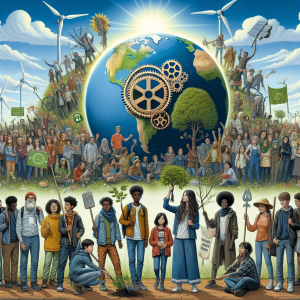Revolutionizing Recycling: New Technologies Leading the Way
The global momentum towards sustainable living has brought recycling to the forefront of environmental strategies. As traditional methods face limitations, innovative technologies are revolutionizing the recycling industry. These advancements are essential in enhancing efficiency, reducing waste, and conserving resources. Let’s delve into the cutting-edge technologies that are reshaping how we recycle, ensuring a more sustainable future for generations to come.
Artificial Intelligence and Machine Learning
Artificial intelligence (AI) and machine learning are increasingly playing pivotal roles in the recycling process. AI-powered sorting systems use advanced algorithms and computer vision to distinguish between different types of waste. These systems can rapidly identify and sort plastics, metals, and other materials, significantly outperforming human capabilities. By enhancing the accuracy and speed of waste sorting, AI-driven technologies reduce contamination rates, optimize material recovery, and lower the overall costs of recycling operations.
Robotics and Automation
Robotic technology is transforming traditional facilities. Robots equipped with sensors and AI capabilities can efficiently pick, sort, and process recyclables. These machines are designed to handle repetitive tasks with precision, improving throughput and minimizing labor costs. For instance, robotic arms can swiftly differentiate and separate materials like paper, plastic, and metal, ensuring a higher purity of recycled products. As robotics and automation continue to advance, their integration into operations promises to streamline processes and improve overall efficiency.
Advanced Materials Recovery Facilities
State-of-the-art Materials Recovery Facilities (MRFs) are embracing technological innovations to enhance processes. These facilities utilize a combination of AI, robotics, and advanced mechanical sorting systems. Implementing cutting-edge technologies like ballistic separators, optical sorters, and eddy current separators allow for precise sorting of mixed recyclables. By improving the accuracy of material separation, MRFs maximize resource recovery, reduce landfill contributions, and create high-quality recycled materials suitable for manufacturing new products.
Chemical Recycling Technologies
Chemical recycling offers a promising solution for processing hard-to-recycle plastics. Unlike traditional mechanical , which involves shredding and melting plastics, chemical breaks them down into their basic molecular structures. This process allows for the recovery of virgin-quality materials that can be used to produce new plastics without degradation. Emerging technologies in chemical include pyrolysis, depolymerization, and gasification, all of which promise to tackle the growing challenge of plastic waste and expand the range of materials that can be effectively recycled.
Blockchain for Accountability
Blockchain technology is being explored to enhance transparency and accountability within the ecosystem. By creating a decentralized and immutable record of recycled materials, blockchain can track their journey from collection to final processing. This robust tracking system helps prevent fraud, reduce waste mismanagement, and assure consumers and manufacturers of the authenticity and sustainability of recycled products. As blockchain applications in recycling mature, they are expected to build confidence in recycling systems and encourage higher participation rates.
Internet of Things (IoT) for Smart Waste Management
The Internet of Things (IoT) is paving the way for smarter waste management systems. IoT devices such as smart bins use sensors to monitor waste levels, optimize collection routes, and provide real-time data on recycling patterns. This information is invaluable for municipalities and waste management companies striving to improve efficiency and reduce fuel emissions. Moreover, IoT-enabled systems can engage communities by sending alerts and notifications, encouraging better recycling practices and elevating public awareness about the importance of sustainable waste management.
Biotechnological Innovations
Biotechnology is unveiling new frontiers in recycling, primarily through the development of bioengineered enzymes and microbes. These biological agents can decompose and recycle materials, particularly plastics, that are challenging for traditional methods. Enzymatic recycling, for instance, uses naturally occurring enzymes to break down plastic polymers into their monomers, which can then be repurposed to create new materials. This promising avenue not only mitigates environmental pollution but also leverages nature’s capabilities to advance recycling efforts.
Energy Efficiency through Smart Recycling Systems
Innovations in energy-efficient recycling systems are crucial for reducing environmental impacts and operational costs. For example, some recycling facilities are employing heat recovery technologies to capture and reuse energy generated during material processing. Additionally, innovative shredding and compaction technologies are being developed to minimize energy consumption and optimize space utilization. These advancements help reduce the carbon footprint of recycling activities and align with global efforts towards energy sustainability.
3D Printing from Recycled Materials
3D printing, or additive manufacturing, is being reimagined through the lens of . This technology enables the production of new products using recycled materials, ranging from plastics to metals. By utilizing recycled feedstock, 3D printing not only conserves resources but also reduces the demand for virgin materials. Emerging solutions are exploring ways to integrate localized processes with 3D printing, empowering communities to transform their waste into valuable goods, thus closing the loop and fostering circular economies.
Educational Platforms and Gamification
Technological advancements extend beyond physical processes, as digital platforms and gamification are increasingly used to promote recycling awareness and action. Mobile apps and online platforms educate users about best practices and provide incentives through reward-based systems. Gamification elements, such as leaderboards, challenges, and achievements, make engaging and interactive, encouraging individuals and communities to participate actively in waste management initiatives. By harnessing the power of digital tools, these educational efforts contribute to a more informed and proactive public.
Overall, these innovative approaches highlight the transformative potential of technology in revolutionizing practices. As the industry continues to embrace these advancements, society moves closer to a sustainable future where efficient resource use and environmental stewardship go hand in hand.



